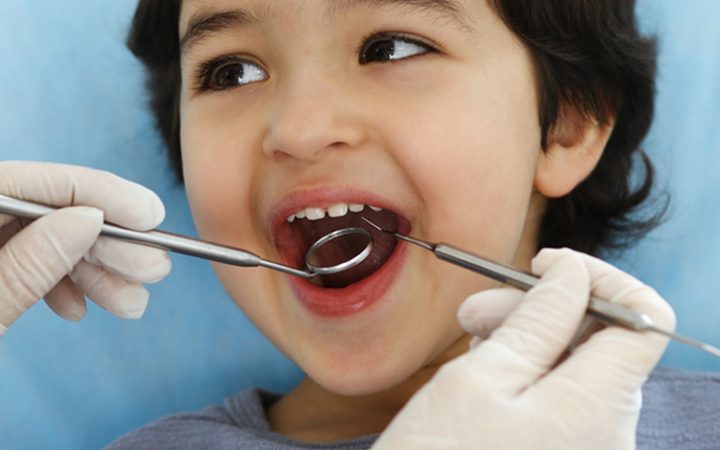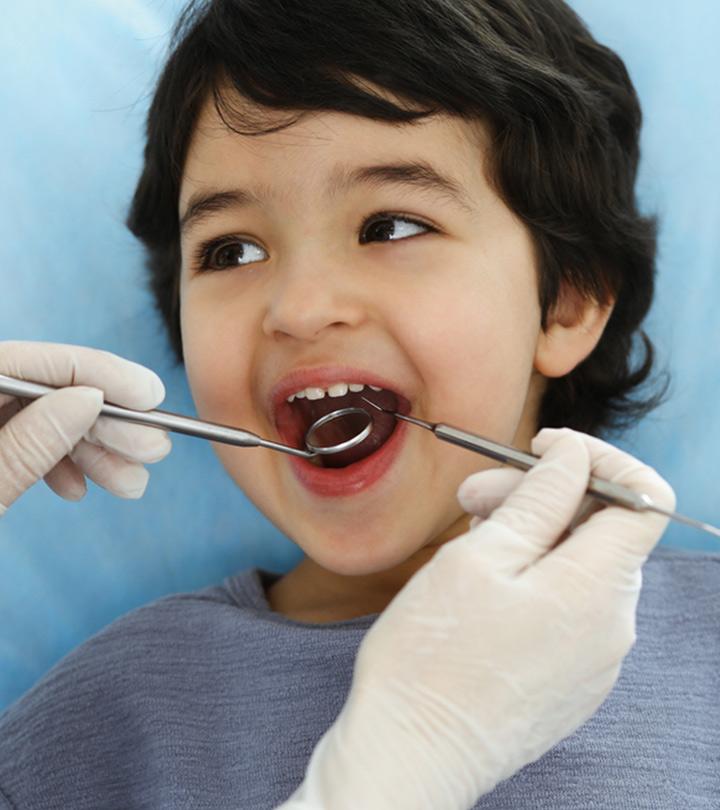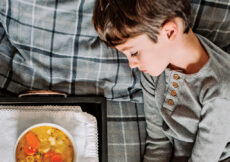Dental health in children forms a vital part of their overall wellbeing. Practicing good oral hygiene at an early age can help set the children on the right path to having strong and healthy teeth for a lifetime. With proper encouragement, children adopt good oral hygiene habits quickly, which can help prevent gum diseases, cavities, and tooth decay.
Read this post to learn about the importance of maintaining good oral hygiene for children and inculcating these habits.
When To Take A Child To Dentist?
The American Academy of Pediatric Dentistry recommends that children get their first dental checkup by their first birthday (1). An early dental visit helps nip the problem in the bud. Furthermore, the dentist will guide you on maintaining proper oral care depending on your child’s needs. It also helps acquaint the child with the dentist and eliminate the fear of dental visits.
You should contact the dentist in case your child (1)
- Complains of a toothache
- Shows signs of discoloration (brownish-blackish discoloration, pus, etc.)
- Experiences swollen gums or cheeks
- Injures their teeth from a fall
It may help to remember that if a child loses a permanent tooth, it should be submerged in milk and taken to the nearest pediatric dentist at the earliest. If the tooth is still viable, it can be reattached ( 2).
Importance Of Dental Hygiene For Children
According to the American Academy of Pediatrics (AAP), dental decay is the most common dental problem among preschoolers. Statistics show (3)
- One in ten two-year-olds has one or more cavities.
- 28% of children have one or more cavities by three years of age.
- Almost 50% of children have one or more decayed teeth by five years of age.
Parents have a common misconception that dental decay in deciduous teeth is not a cause of concern as they are temporary. However, dental decay and loss of deciduous teeth can also negatively impact the health, eruption, and positioning of permanent teeth, leading to dental problems in the future.
Tips To Keep Your Child’s Teeth Healthy
The following tips can help you maintain your child’s oral hygiene(1) (4).
- Brush their teeth twice a day
- Use a non-fluoride toothpaste until your child learns how to spit toothpaste out
- Encourage flossing as their teeth begin to touch each other
- For children under the age of three, use toothpaste the size of a grain of rice. Alternatively, for children above three, use a pea-sized amount
Image source: American Dental Association
- If your child wants to clean their teeth themselves, supervise them until they are about eight years old to ensure they clean all the areas well (5).
- Encourage your child to rinse their mouth with water after lunch and snacks as it helps wash away any food
- Avoid putting them to bed with a milk bottle in their mouth to prevent nursing bottle caries or upper front teeth decay.
- Whenever your child is thirsty, offer them fluoridated Soda, juice, sports drinks, and other sugary drinks can not replace water.
- Fluoride plays a highly important role in pediatric dental health and reduces the risk of cavities by hardening the tooth enamel. Most children get the required fluoride from drinking water, and some dentists may also apply fluoride varnishon children’s teeth during dental appointments.
- Ensure that your child does not swallow fluoride-rich toothpaste or mouthwash as too much fluoride could lead to brown-black spots and pits on the teeth, make them brittle, and may also be harmful to the body.
- Pit and fissure sealants are protective plastic coatings applied to the biting surface of the back teeth to form a barrier. It, therefore, prevents food and bacteria from entering the tiny grooves of the teeth (6). According to the Centers for Disease Control and Prevention and the American Dental Academy Center for Evidence-Based Dentistry, sealants reduce the risk of decay in molars by almost 80% (4).
- Avoid sharing spoons and forks with your child during mealtimes to prevent germs from entering your child’s mouth. Likewise, when a pacifier falls from your baby’s hands or mouth, clean it before giving it back to the child.
- Children who consume many sugary food and drinks are at an increased risk of developing dental decay. Hence, limit snacks between meals, and ask the child to brush their teeth after consuming anything sugary.
- Older children may safely use sugarless chewing gums as they help strengthen the jaws, produce saliva, pick out bits of food, freshen the breath, and balance the acid that may lead to tooth decay.
- If your child plays sports, they should wear a mouthguard—a soft, plastic retainer that covers the teeth and, at times, the lips—to protect their mouth from injuries.
Tips To Make Dental Hygiene Fun For Children
The following tips may help your child be willfully involved in oral hygiene maintenance (1):
- Let the child pick their choice of toothbrush in their favorite color.
- Let the child pick a toothpaste of their choice of flavor.
- Read books to them that talk about dental hygiene.
- Use a timer or play their favorite song to ensure they brush for two minutes.
- Use stickers, stars, or apple slices as rewards for good oral care.
Toothbrushing Technique For Children
There are various effective ways of brushing teeth. The best brushing technique for your child depends on the teeth position and gum condition. Thus, your child’s pediatrician or pediatric dentist can help you decide the right brushing technique for them.
Most healthcare providers recommend following a circular brushing technique twice a day (7):
- Hold the toothbrush at a 45° angle adjacent to the teeth.
- Brush only a few teeth at a time in a circular or elliptical motion. Continue doing the same until the entire mouth is covered.
- Gently brush the outer, inner, and chewing surfaces of the teeth.
- Following, brush the tongue to remove bacteria and eliminate bad odor.
Effective oral hygiene maintenance is essential to prevent decay. Dental checkups at least twice a year and regular toothbrushing and flossing can help prevent most issues related to teeth and the surrounding structures.
References:
MomJunction’s articles are written after analyzing the research works of expert authors and institutions. Our references consist of resources established by authorities in their respective fields. You can learn more about the authenticity of the information we present in our editorial policy.



































